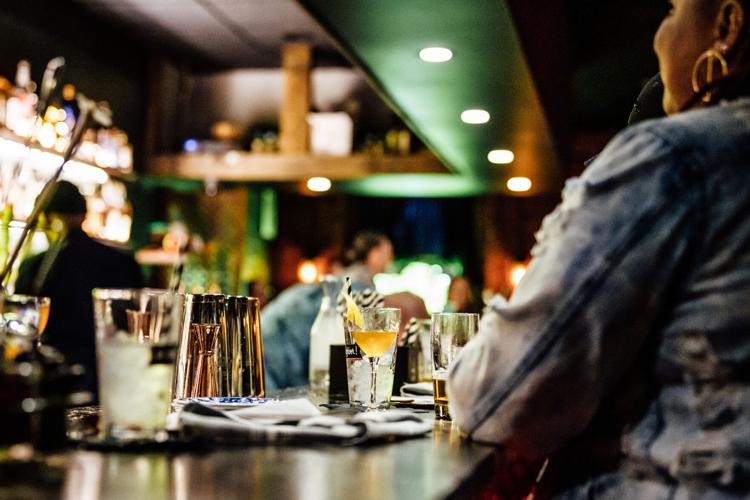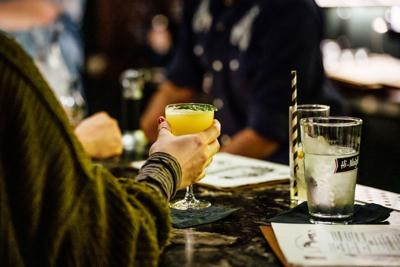COLUMBIA — Scan the bar. Keep an eye on people who seem down. And on people who are cheering on their favorite sports team. On people mourning or celebrating. Don’t serve an intoxicated person.
The consequences for South Carolina bartenders who don’t follow those rules to a T could be jail time, fines, suspension of the bar’s liquor license and lawsuits.
But alcohol isn’t served in a vacuum. Even if it was, the state has loose requirements around how bartenders must be trained, and it has no clear legal definition of what it actually means to serve an intoxicated person.
And with the myriad ways that people do or don’t show signs of inebriation, bartenders are left to grapple with vague rules and off-the-cuff estimates about how much someone’s been served.
As the cost of the required liquor liability insurance policies for South Carolina establishments that serve alcohol after 5 p.m. skyrockets, those bartenders have found themselves at the center of debates over moral responsibility and legal liability that have drawn in business owners, state legislators, personal injury lawyers and anti-drunk driving advocates.
“You have to repeat to your employees over and over again, ‘Do not over serve.’ We’re all responsible for this, you have to make sure that everybody behind that bar has a sense of responsibility about it,” said Will Green, who owns Rosewood neighborhood bar The Hoot.
‘Can’t breathalyze somebody at the door’
The law itself seems simple: Don’t serve alcohol to someone who is already intoxicated.
But that law doesn’t define what it means to be intoxicated, unlike state rules around driving under the influence.
Add to that the litany of factors that can affect someone’s blood alcohol content like physique, gender and prevalence of certain medications or drugs, and bar owners said it puts them in a compromising position when it comes to liability.
“It isn’t just about the alcohol, it’s about what (other drugs) are they on? We have no idea. Obviously we can’t breathalyze somebody at the door, and even if we did, it’d be ineffective,” said Andy Rodgers, who owns Art Bar in the Vista.

As the cost of liquor liability insurance policies skyrockets, bartenders have found themselves at the center of debates over moral and legal responsibility.
The frustration from bar owners is multi-faceted.
Even bars with no lawsuits levied against them have seen steep increases in the amount of money they pay for liquor liability insurance policies, which the state made mandatory for restaurants and bars serving drinks after 5 p.m. in 2017.
That frustration is driving a push from business owners and some state legislators to reform liability laws, which opponents said would make it harder for victims of DUI-related injuries or death to recover damages.
“(The victims) clearly are the losers in this situation, just so that a bar who broke the law can keep more of their money,” said Steven Burritt, who leads South Carolina’s branch of Mothers Against Drunk Driving.
But for the bars that have faced lawsuits accusing them of over-serving a patron to the point of injuring or killing someone in a car accident, owners complain there’s no clear way for their bartenders to keep tabs on every patron, especially when it comes to people ordering drinks for others.
“(Let’s say) someone had 20 shots on their receipt. Did they take one and give the other 19 to their friends? There’s no way for the bartender (to know),” said Jon Sears, who owns popular Five Points bar Jake’s on Devine. “Obviously if someone orders 10 shots and rips them right there, then we know that person’s not going to get served again, but that’s not how it works.”
His bar, which draws hundreds of college students each weekend, has been sued more than a dozen times in the last few years.
But not all bar owners agree with this thinking. Chad McGowan, a personal injury lawyer who owns Legal Remedy Brewing in Rock Hill, doesn’t see it as much of a gray area for bar owners.
“It’s a privilege to be able to sell alcohol,” McGowan said. “Part of the deal is that you must act reasonably and not over-serve visibly drunk people, and there are ways to prevent that … it’s relatively easy to not over-serve people and to comply with the law.”
Working together to share responsibility
Bars’ responsibility to keep people safe and avoid lawsuits becomes a team effort.
Routine conversations with bar staff and servers about the need to pay attention to how many drinks someone has had, bouncers alerting bartenders about customers who might need food or water as opposed to more alcohol, and a more hands-on approach from an owner are all ways bars have found to mitigate the risk when it comes to serving alcohol.
“Our door guys will also watch out for that,” said Lauren England, a bartender at Main Street's Transmission Arcade Bar. “We’re not going to let people in if they’re already plastered, you know, stumbling down the street and yelling.”
At WECO Bottle & Biergarten, bartender Dylan Dickerson said it’s rare he has to cut someone off given the bar's laid-back atmosphere, but he routinely monitors the outdoor area when not pouring drinks, checking for signs that someone is being over-served.
“At most bars, if you see people putting their head down (on the table), it’s pretty much a done deal,” Dickerson said. “At that point, it’s pretty much over. Like, obviously you don’t really need anything else.”
‘We’ve got a really important job to do’
Some restaurants and bars, like O’Hara’s Public House in Lexington County, give their staff hands-on training by bringing in the State Law Enforcement Division.
But state law doesn’t actually require most bartenders to receive formal training. Alcohol safety training, such as the National Restaurant Association’s ServSafe Alcohol class, is only required for servers at breweries and micro-distilleries.

A glass of beer sits on a bar counter in front of a patron as they wait for the arrival of their food at The Hoot in Columbia on February 2, 2024.
“You couldn’t attend (SLED’s) training without being impacted by it, without saying, ‘Hey, this thing that we knew, it’s actually really important and it’s serious,’ ” the Lexington pub’s owner Matt O’Hara said. “It isn’t just about having fun at the bar … we’ve got a really important job to do.”
Last year, 430 S.C. bartenders took the ServSafe class, according to data from the South Carolina Restaurant and Lodging Association. Data on how many bartenders took a similar class, known as TIPS Alcohol Training, wasn’t available.
The laws around micro-distilleries and breweries were written much more recently, as compared to older liquor laws, which could be a reason for the specification of training for certain establishments but not others, McGowan, the Rock Hill attorney, explained.
Changing those requirements and making it mandatory for bartenders to attend the training, typically a four-hour online course that runs each participant $30, is something that advocacy groups like MADD argue could decrease drunk driving crashes and fatalities, like the death of a bride on Folly Beach who was killed on her wedding night in April.
But each bar is different, and blanket alcohol training often doesn’t take into account the many types of situations a server or bartender can be put in, said Phill Blair, who owns WECO Bottle & Biergarten.
Blair, who owned the longtime dive bar The Whig across from the Statehouse before it closed in late 2022, made his employees take a training course. At his laidback West Columbia biergarten, WECO, he doesn’t require it and instead opts to have regular meetings with his staff.
“Every bar, restaurant, every concept is so different. The way you interact with the customers is different, the time you have to interact with them is different,” Blair said. “Interacting with people at The Whig during a fast-paced event is much different than we would do (at WECO) at 2 in the afternoon on a Wednesday.”













